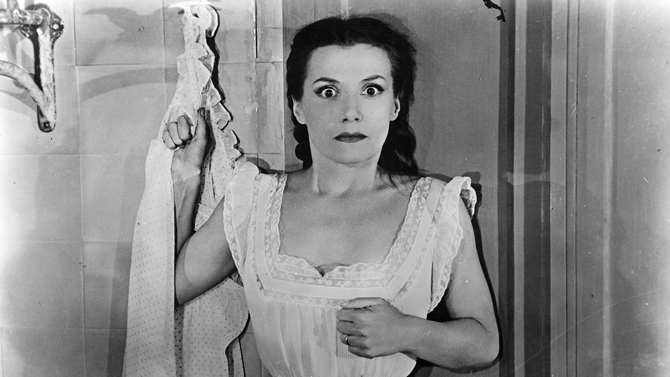When hearing the name Clouseau, most people automatically think of the bumbling French detective made famous by comedy genius Peter Sellers in the Pink Panther movies, or the uninspired remakes with Steve Martin. Yet I am not referring to that character, instead I am talking about serious film director Henri-Georges Clouzot who directed the horror mystery/thriller Les Diaboliques in 1955.
This French motion picture is a true classic for several reasons. Most importantly, it is considered to be the first movie to have a true twist-ending; one that has been borrowed and reworked over and over again in later films. This new way of ending a film interested Alfred Hitchcock so much that his next flick, Vertigo (the novel was written by the same authors of Les Diaboliques; Boileau-Narcejac) featured a twist as well. Also, Les Diaboliques used the iconic advertising ‘do not tell your friends the ending’ and the ‘no admittance after the movie begins’ ploy to build up interest in the film, which Hitchcock reworked five years later with Psycho. Finally, one can draw a comparison to Psycho once again, as it is said this movie did for bathtubs what Psycho did for showers.
The plot follows Christina Delassalle, (Véra Clouzot – wife of the director) who plays the wife of harsh and cruel headmaster Michel Delassalle (Paul Meurisse), and Nicole Horner (Simone Signoret), his mistress, as they conspire to kill their husband and lover. The story does not lie solely in the murder but what happens afterwards. Without giving too much away, the headmaster’s body disappears which leads to some strange occurrences that affect the two women. Beyond that, the rest must be left in darkness to maintain the excellent finale of the film. I will say that the sense of dread that builds during the climax is superb. Also, the final lines of the denouement bring up a clever and thought-provoking ending that make us question what we have seen before.
Clouzot was said to be a meticulous perfectionist. To prove it, it is said that when the women were carrying the large basket which held the corpse, he actually had a male actor inside so that the weight was authentic. Also, it was reported that the decaying food that the teachers and children ate during the school dining hall scene was actually rotten.
Another point worth mentioning is the amazing freedom of expression that was allowed at that time in France. The fact that the scriptwriter and actors were able to be so liberal in exploring this subject matter and these characters is, in part, why this film is so entertaining. For instance, Clouzot and Meurisse were able to direct and portray the headmaster as a convincingly cruel and vicious man who abuses his wife in public. It is such realism that adds extra depth to his character and allows the viewer to feel a true hatred for the man, which in turn creates audience empathy for the women in spite of their intentions. Also note the flimsiness of Vera Clouzot’s nightgown toward the end of the film. These are examples of things that were not seen in American movies of that time.
Much like my observance in the review for The Orphanage, this film also has touches of many different genres rolled into one; with aspects of horror, a ghost story, film-noir, drama, thriller and a murder mystery all wrapped up into one solid screenplay written by Clouzot himself along with Jérôme Géronimi. It is these elements that add great layers and detail to the story, as well as help it appeal to a broader spectrum of movie fans.
On the musical front, Les Diaboliques is quite unique. The opening credits feature an excellent dark orchestral score written by Georges Van Parys that features a children’s choir which draws us into this eerie and macabre story. The music is silenced once the movie begins and we are left without it until the final lines of dialogue have been spoken. It is an unusual format to bookend a movie with a powerfully moody score and then leave the rest of the film without a composition, but somehow the transition from up-front score to total musical silence adds to the intriguing aspects of the flick and does not take away from it as many would think.
The acting must also be commended. The main triumvirate of Clouzot, Signoret and Meurisse all perform their roles brilliantly. Clouzot captures the soft fragility of Christina beautifully, while Signoret elicits a noticeably masculine and harsh performance as the dominating female. Finally, Meurisse demonstrates the abusive and vile man’s persona with ease.
In the end, this heart-pounding thriller is as iconic as advertized and definitely worth multiple views. The superb acting, detailed directing and first ever twist-ending are sure to please. Bravo, Clouzot!
English Subtitles
Part of the Criterion Collection

